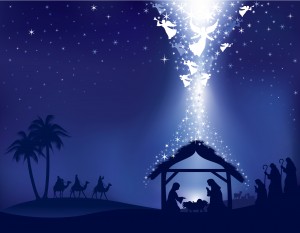 Like many of my readers I have attended Christmas services and listened once again to the narratives of stables, shepherds and wise men. Sometimes the preacher will have side-stepped the historical problems of the Christmas stories by focusing on peace in the world or the latest social issue such as the proliferation of food-banks. Few preachers want to go very deeply into the actual stories that are told to accompany the birth of Jesus. This blog post is not meant to start a deconstruction of these nativity stories but we may note that few scholars regard them as straight historical records. Taking the four gospel records together we can see that two of the gospels, John and Mark, have no narratives about the birth while Luke and Matthew have one main story each. Luke records the shepherds tradition and Matthew introduces the wise men. At the very least we can say that there was no single early narrative tradition about what happened when Jesus was born. Even if Luke ‘s account may possibly give us recollections from Jesus’ mother, those particular traditions were not thought important enough to be remembered in the churches that Mark, Matthew and John represented towards the end of the 1st century.
Like many of my readers I have attended Christmas services and listened once again to the narratives of stables, shepherds and wise men. Sometimes the preacher will have side-stepped the historical problems of the Christmas stories by focusing on peace in the world or the latest social issue such as the proliferation of food-banks. Few preachers want to go very deeply into the actual stories that are told to accompany the birth of Jesus. This blog post is not meant to start a deconstruction of these nativity stories but we may note that few scholars regard them as straight historical records. Taking the four gospel records together we can see that two of the gospels, John and Mark, have no narratives about the birth while Luke and Matthew have one main story each. Luke records the shepherds tradition and Matthew introduces the wise men. At the very least we can say that there was no single early narrative tradition about what happened when Jesus was born. Even if Luke ‘s account may possibly give us recollections from Jesus’ mother, those particular traditions were not thought important enough to be remembered in the churches that Mark, Matthew and John represented towards the end of the 1st century.
So what part of the Christmas narrative can we value as capturing what the whole thing is about? For me the Christmas event is summed up in the words ‘the Word became flesh’ in the first chapter of John. To grasp the significance of these apparently simple words, we have to ponder a moment to see what John means by the Greek word ‘Logos’ which is translated as Word. This translation is, it has to be said, a very weak rendering of the Greek original. The English word simply refers to a something written or spoken. The Greek word and the Hebrew one behind it is a word that can be said to be brimming with energy and content. Hebrew words seldom have but one meaning and the Hebrew word for ‘word’, Dabar, is no exception. To begin to understand the English use of ‘word’ and the Hebrew use, we have to think for the moment of the difference between a statement of fact and an oath. In the first, words are used descriptively and in the second they are used to make a point with force. An even more powerful use of the power of a word is when it is used in the context of a creative act. We can give many examples of this in the Old Testament, particularly in the Psalms. ‘God spake and it was done, he commanded and it was created’. The quote ‘By the word of the Lord were the heavens made’, also reflects an understanding of the way the Word of God operates. A scrutiny of a bible concordance will throw up numerous other examples.
When we return to John’s first chapter and ask ourselves what John might be referring to when talks about the Word becoming flesh, we can begin to see that he is saying something fairly massive in its importance. The ‘Word’, the creative and effective outpouring of God, the efficient instrument of his purpose and will, has become visible and effective in the world. In short when God speaks through his Word, he is not just communicating ideas and concepts, he is communicating his very creative power-giving self. To receive the Word in Jesus is to receive this same outpouring, the very being of God communicated through his self-expressing Word.
A few years I stood up after a Carol Concert to speak a very few words. I found myself saying that the essence of Christmas is not in the story of shepherds and Wise Men but a grasping of one single truth, God is for us, God is on our side. Perhaps that is all we need to understand this Christmas time. Reality in all its mystery, its incomprehensibility is ultimately friendly and is working for our good. ‘ Do not be afraid’ said the angels, ‘I bring you good news of great joy..’ May this Christmas be a time to capture a little of that joy, the joy of knowing that God is both with us and for us. If that is true, even in a small way, then we need never again be afraid.